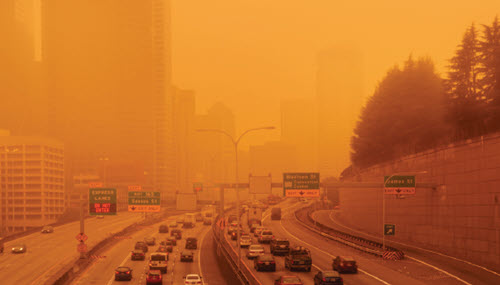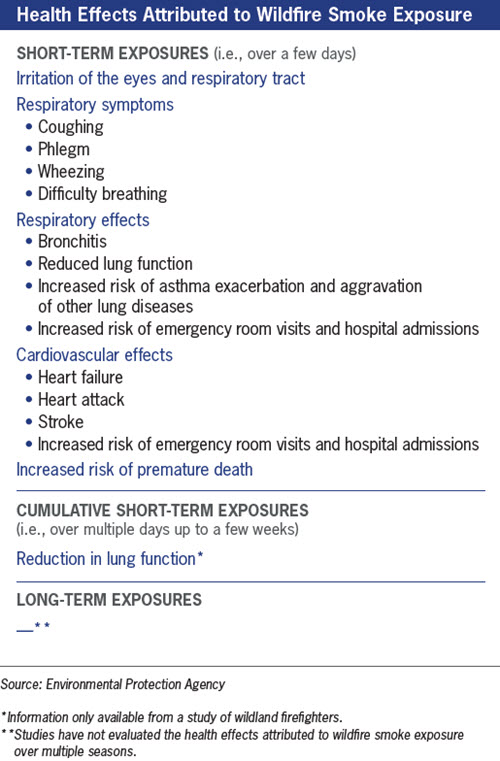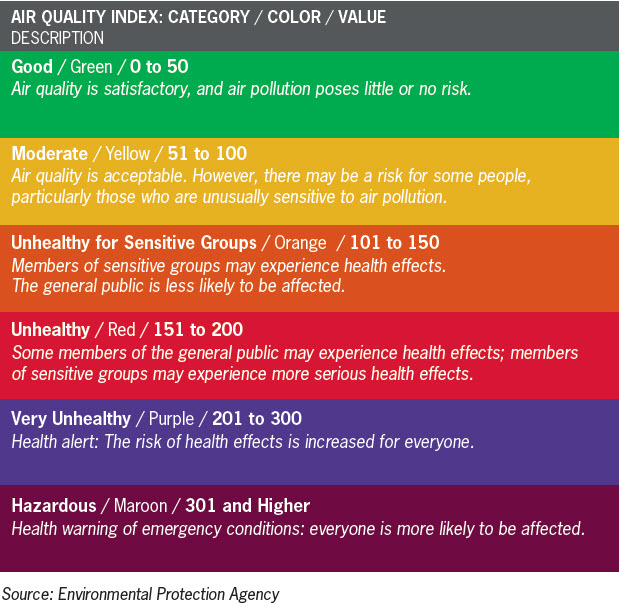
Wildfire smoke can pose serious occupational health risks. Employers need to keep their workers safe with a focus on exposure control, communication, and training.
Particle pollution is a principal health threat from short- and long-term exposure to wildfire smoke. However, wildfire smoke is a complex mixture that includes other pollutants shown to lead to a variety of health effects. These range from relatively minor (e.g., eye and respiratory tract irritation) to more serious health impacts (e.g., exacerbation of asthma and heart failure, and premature death).
However, wildfire smoke is a complex mixture that includes other pollutants shown to lead to a variety of health effects. These range from relatively minor (e.g., eye and respiratory tract irritation) to more serious health impacts (e.g., exacerbation of asthma and heart failure, and premature death).
The Air Quality Index (AQI) is a nationally uniform color-coded index developed by the EPA for reporting and forecasting daily air quality. The AQI reports the most common ambient air pollutants regulated by the Clean Air Act, including ozone and particle pollution. The AQI informs the public about air quality in the area, tells who may be affected, and provides steps to reduce exposure when pollution levels are unhealthy. The AQI is divided into six categories corresponding to different levels of health concern. The category breakpoints are based on a review of health effects’ evidence. Each category has a specific color that makes it easy for people to know when air quality is reaching unhealthy levels in their communities.
What Employers Can Do to Keep Workers Safe
Focus on these key areas:
Exposure Control
Check the AQI level at the start of each shift and periodically thereafter. Various government agencies monitor the air. To obtain data closest to your business, go to the EPA page, www.airnow.gov, which also provides other methods to obtain AQI data.
 Consider the following steps:
Consider the following steps:
Whenever feasible, employ engineering controls, such as providing enclosed buildings, structures, or vehicles where the air is filtered to reduce exposure.
- If engineering controls are insufficient, implement administrative controls (e.g., relocating work to a healthier location, changing work schedules, reducing work intensity, or providing additional rest periods).
- Provide National Institute for Occupational Safety and Health-approved respirators, such as N95 respirators. Use these respirators rather than dust masks, bandanas, scarves, etc.
- As air quality worsens, mandate the use of respirators for all employees.
Communication with Employees
- Establish and implement a system to inform employees about the wildfire smoke hazards in a language and manner understandable by all employees. Include information on the current and protective
measures available.
- Encourage employees to inform their employer if the air quality worsens or if they experience any adverse respiratory symptoms from wildfire smoke.
Training
- Provide training on specific wildfire smoke hazards, including its health effects, the right to obtain medical treatment without fear of reprisal, and how to obtain the current AQI.
Wildfire smoke poses a serious occupational health risk. Act now to protect your employees.
Resources
Outdoor Workers Exposed to Wildfire Smoke
Wildfire Smoke and Your Patients' Health
Fire and Smoke Map
If you have any questions or would like additional information, please contact your local PMA Risk Control Consultant or reach out to us at heretohelp@pmagroup.com.
IMPORTANT NOTICE
The information and suggestions presented by PMA Companies in this risk control technical bulletin are for your consideration in your loss prevention efforts. They are not intended to be complete or definitive in identifying all hazards associated with your business, preventing workplace accidents, or complying with any safety related or other laws or regulations. You are encouraged to alter the information and suggestions to fit the specific hazards of your business and to have your legal counsel review all of your plans and company policies. PMA Companies and Old Republic Companies do not provide legal advice and the information and suggestions in this bulletin should not be considered as such.

 However, wildfire smoke is a complex mixture that includes other pollutants shown to lead to a variety of health effects. These range from relatively minor (e.g., eye and respiratory tract irritation) to more serious health impacts (e.g., exacerbation of asthma and heart failure, and premature death).
However, wildfire smoke is a complex mixture that includes other pollutants shown to lead to a variety of health effects. These range from relatively minor (e.g., eye and respiratory tract irritation) to more serious health impacts (e.g., exacerbation of asthma and heart failure, and premature death). Consider the following steps:
Consider the following steps:
